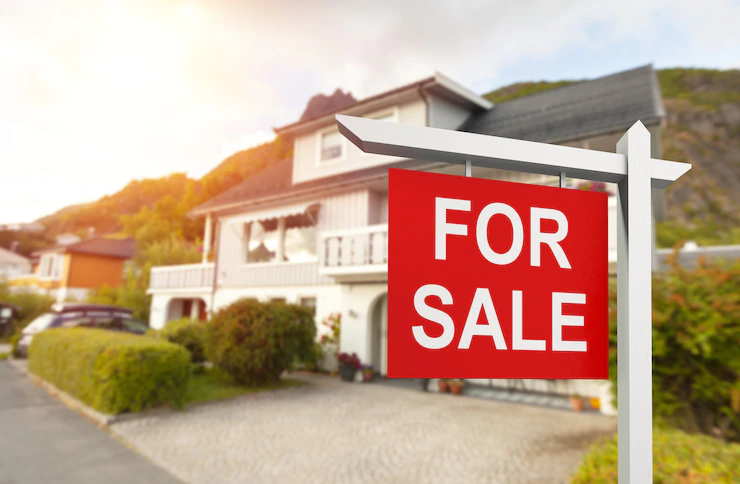You’ve spent countless hours getting your house ready to go on the market. The last thing you want is for your listing to grow stale due to little interest. Even perfect homes sometimes fail to attract the attention they deserve. And unfortunately, the longer it takes, the more buyers begin to think there is a problem with the home.
If your house hasn’t sold, you may wonder why it isn’t selling and what you can do to speed up the process. Whether it’s a buyer’s or seller’s market, simple changes can help your home live up to its true potential.
Here are a few reasons your house won’t sell and how you can attract the right buyer’s interest.
Top Reasons Your House Isn’t Selling
The Price Is Too High
Overpricing is one of the worst mistakes a seller can make, and it may be why your home is currently sitting on the market. If you overprice your house, it won’t sell, regardless of its great features.
Pricing a home is complex. So, how do you know if your home is overpriced? Make sure to consult your agent. They’ll have the best idea of what’s selling in your area and how your price compares to similar homes.
Alternatively, you can browse local listings. If your home is priced higher than homes in the area with better features and more upgrades, your problem is most likely the price.
You’re Not Staging Your Home Properly
When it comes to selling your home, how you present it to buyers is crucial. A good staging process emphasizes a home’s best features by minimizing distractions and optimizing its layout and design.
When buyers open the door, they want to feel right at home, not confused or startled. Stagings allow buyers to get a feel for your home and give them a chance to envision the space as their own.
The Listing Is Boring
A well-written listing description can work wonders for driving traffic to your open house. Clear writing with engaging descriptions of the home’s best features and amenities will help buyers easily picture themselves living in the home and neighborhood.
It’s important not only to describe the physical location and features of the property but also how those elements will make life extraordinary for the lucky family who gets to live in it. Describe the qualities that made you originally fall in love with your home, and buyers will feel the magic, too.
Market Timing Is Not in Your Favor
Selling your home at different times of the year can impact its market value. Spring is a popular time to purchase a home in many markets because families want to move and get settled in before the school year begins. Conversely, selling your home in the fall or winter may take longer to get the best offer due to fewer buyers in the market.
Talk to your real estate agent to find the best time to list your home in your area. It’s sometimes necessary to take a house off the market and reposition it 30 to 45 days later if it isn’t selling.
Your Home Has a Specific Problem
A showing can give you valuable insight, even if there is no buyer. Have your agents ask potential buyers questions like, “What’s wrong with this home?” or “What could be improved to make you want to buy this home?” If you get the same answer from several people, you know there is a problem that needs to be addressed.
What To Do if You Can’t Sell Your Home
Address Any Problems
You’re moving. Understandably, you don’t want to fix things you’ve ignored for years, but little upgrades often bring a significant return on investment. Consider investing in improvements, such as hiring a professional stager or buying a new carpet to easily increase the value of your house.
Once you’ve identified a problem area, you can work to fix it. If multiple buyers say your house is too small or too dark, try adding lighting, mirrors, new paint, decluttering the home, or hiring someone to deep-clean the windows.
You also may need to address a significant cosmetic flaw or expensive repair. Peeling paint on the siding isn’t doing you any favors, and neither is a broken HVAC. If you don’t get major repairs fixed and decide to sell as-is, be prepared to have that reflected in the home’s selling price.
Reconsider the Price
When it comes to getting the value you’d hoped for, a price cut might seem like the kiss of death. But in reality, price reductions are pretty common and sometimes necessary to reel the right buyers in.
Speak to your agent about your concerns, and do not be afraid to ask questions if you want to understand why your home is priced the way it is. Take note of the feedback you get at open houses and showings. Are they disappointed at the home’s quality compared to the price?
Another way to predict what buyers would pay is carefully reviewing recent sales and making dollar adjustments to your property based on competitive differences.
Take Better Pictures
First impressions matter. If you haven’t already done so, replace your iPhone photos with professional ones. If media isn’t included with your agent or you’re listing the property yourself, a small investment in professional photography will deliver huge returns.
Professional photos can earn more money on your final sale price. Higher-quality photos can also increase the number of people clicking on your listing, which can double the attention your home gets from buyers.
Improve Your Staging and Curb Appeal
The most effective way to improve your home’s marketability is to enhance its appeal both inside and out. The inside of your house needs to feel clean, fresh, and welcoming. This means cleaning, patching, painting, freshening up, and removing all excess clutter and furniture.
On the outside, focus on maintaining your house’s landscaping and irrigation, planting some flowers, and fixing any weathered or broken parts.
The Bottom Line
If your home is sitting on the market and you’re worried, know that you are not alone. To maximize your home’s value and attract more buyers, you can use a variety of simple and affordable strategies
It’s important to consider that every house is unique, and your realtor may have specific feedback that will help you decide what enhancements will make your home stand out. Talk to your agent about updating the listing, getting creative with marketing, and any needed changes in the home.










